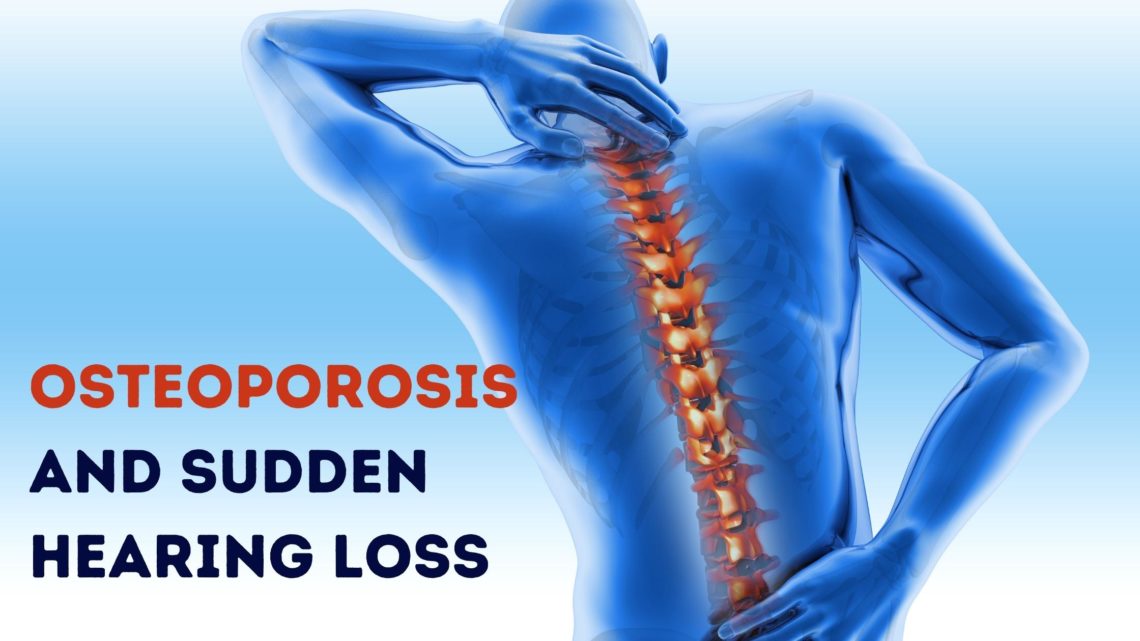Osteoarthritis is the most common form of arthritis people over 45. It is a degenerative disease of the bones, causing them to become weak and brittle. Over time your bones can become so fragile that a minor fall that you could have bounced by from in your youth can cause bones to break. Even a minor stress such as bending over, or coughing can cause bones to fracture. The most common breaks associated with this serious disease occur in the hip, wrist, or spine. This debilitating bone disease can make it hard for people to get out safely on their own and enjoy a high quality of life. Now researchers are finding that people with osteoporosis are twice as likely to also suffer sudden sensorineural hearing loss.
What Is Osteoporosis?
Bone is living tissue that is constantly being broken down and replaced. As osteoporosis develops the creation of new bone tissue cannot keep up with the loss of old bone. Osteoarthritis is the most common form of arthritis affecting 32 million people in the US of all races and genders. It is more common in men younger than 45 but post 45 years old it is more prevalent in women, particularly to women of Caucasian or Asian descent. Often referred to as a degenerative joint disease because it occurs frequently in the hands, hips, and knees.
This is because with Osteoporosis, the cartilage within a joint begins to break down while simultaneously, the underlying bone begins to change slowly over time. At first it can start as pain, stiffness and swelling but quickly make bones incredibly fragile and prone to breaking. Eventually it can impede a person’s ability to participate in daily life.
Risk Factors for Osteoporosis
There are several risk factors such as gender, age, genetics, and race that clearly cannot be modified, however certain lifestyle choices do increase the likelihood of developing this condition sooner. These preventive tactics can make a big difference in the health and strength of your bones for years to come.
Excessive Alcohol Consumption: Excessive drinking interferes with the balance of calcium, an essential nutrient for healthy bones. This is especially true for those who engage in these activities at a young age.
Smoking: Nicotine in tobacco products affects the body’s ability to absorb calcium. This can cause lower bone density and weaker bones. Smoking can also slow the production of the bone-forming cells that are essential to healing.
Exercise: Regular exercise can reduce your chance of falling by improving sense of balance and protecting bones by increasing muscle mass. Exercise also has the potential to slow the rate of bone loss.
A Healthy Diet: Avoid too many calories and eat a diet full of whole grains, vegetables, fruits, and lean proteins such as fish , poultry, nuts, seeds and beans. Foods with ample protein, calcium, vitamin D, can enhance bone health. Some common foods to add to your diet to reduce the risk of osteoporosis include dairy, green leafy vegetables, canned fish such as sardines with the bones and almonds and brazil nuts.
What is Sudden Hearing Loss?
Sudden sensorineural hearing loss (SSHL) is the rapid loss of hearing. This usually occurs all at once or quickly over just a few days. Most commonly affecting just one ear, this occurs due to an issue with the sensory organs of the inner ear. Most commonly SSHL occurs due to an excess of earwax, ear infection, a burst eardrum or Meniere’s disease. It has also been connected to osteoporosis.
Osteoporosis and SSHL
Researchers in Taiwan have begun to quantify the risk of sudden hearing loss in osteoporotic patients. The results of their study were published in the June 2015 edition of The Journal of Clinical Endocrinology & Metabolism. The researchers used a random representative sample of 1 million participants in the records of Taiwan’s National Health Insurance program. They discovered that those with osteoporosis had a 1.76-fold risk of experiencing sudden sensorineural hearing loss. This is suspectedly due to the tiny bones of the inner ear which we rely on for sound. The inner ear holds the smallest bones in the body, and they can be damaged as bones become weaker due to osteoporosis.
What Can You Do?
Make sure to modify your lifestyle to reduce your risk of bone disease. It is also helpful to schedule regular hearing exams. The sooner you can detect a hearing loss the sooner it can be treated.

